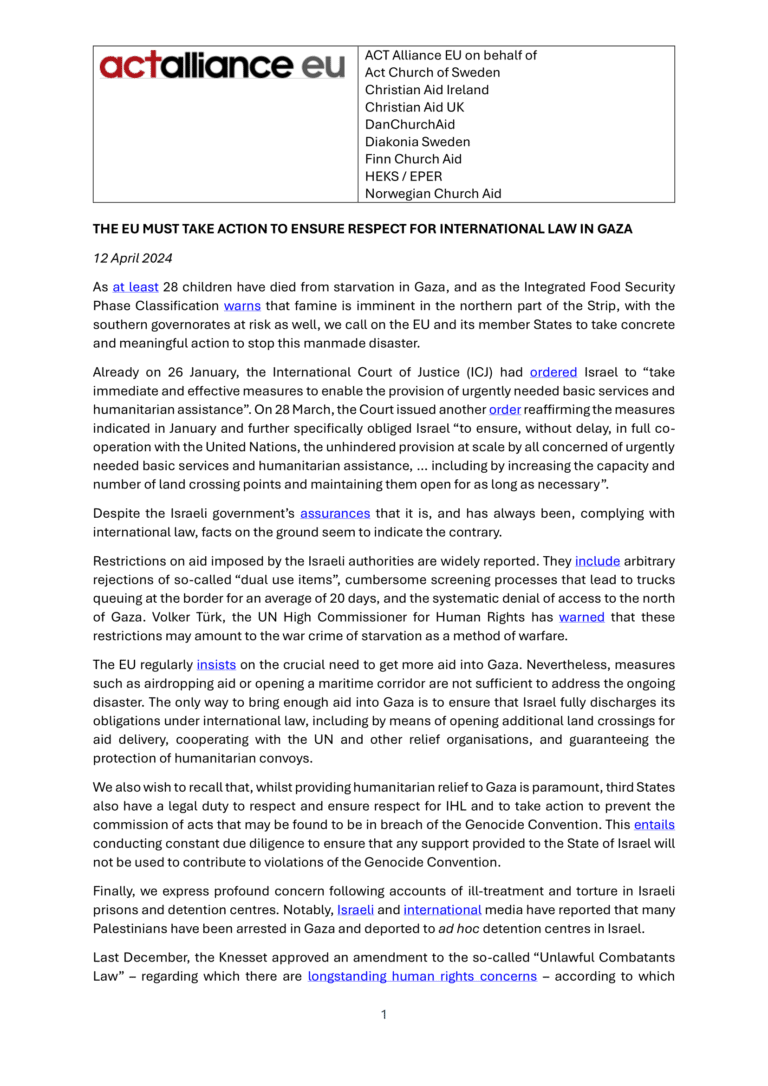We advocate for social, economic and environmental justice and for all people to enjoy their fundamental rights.
Welcome to ACT Alliance EU – a network of European church-based humanitarian and development NGOs.
We long for a world where all people, in all their diversity, live a life marked by dignity, free from poverty, and in societies that are just and fair.
Along with our members, we advocate for humanitarian and development policies and actions that enable lasting social, economic and environmental change.
We emphasise the importance of a diverse and vibrant civil society. Central to our work is the conviction that local communities and actors are best placed to lead change and make informed decisions about how development and humanitarian aid can meet their needs.
We advocate for social, economic and environmental justice and for all people to enjoy their fundamental rights.
Civil society plays a vital role in promoting democracy, gender equality and social protection.
We advocate for a shift in power towards local actors, who face huge barriers to funding and decision making in humanitarian response.
As Israel's key economic partner and a major Palestinian donor, the EU holds a pivotal role in advancing a just peace in Israel and Palestine.
We are a diverse network of 12 European church-based NGOs working on disaster relief, poverty alleviation and sustainable development.
We are also linked to the global ACT Alliance, a network of 145 Protestant and Orthodox churches and humanitarian organisations operating in over 120 countries.

The Implications of Sida’s Decision on Strategic Partnerships: A Conversation with Eva Ekelund
In a recent dialogue with CIVICUS, Eva Ekelund, Deputy Director of Act Church of Sweden, expressed profound concerns over the Swedish International Development Agency’s (Sida) abrupt decision to terminate existing agreements with strategic partner civil society organisations (CSOs). The decision to terminate these partnerships threatens critical human rights-based development initiatives and jeopardises the important work of development organisations in partner countries.
Sida’s Role and Recent Shifts in Strategy
Sida, the arm of the Swedish Ministry of Foreign Affairs tasked with managing Sweden’s aid budget, has traditionally focused on poverty reduction in developing nations through partnerships with civil society. Historically, these collaborations were sustained by multi-year agreements based on principles of inclusivity, local ownership, and transparency, fostering a predictable and flexible cooperation environment.
However, the landscape shifted dramatically on February 1, 2024, when the Swedish government introduced a new, one-year strategy for development cooperation, deviating from the longstanding practice of consulting with Swedish civil society in shaping such strategies. The abrupt change was followed by an announcement on March 29 that all agreements with its strategic partners would be terminated by the end of December 2024, a move that Ekelund describes as “unprecedented” and damaging to decades of trustful relationships with the civil sector.
Concerns Over New Selection Processes and Reduced Transparency
The new strategy ushers in a hurried and opaque selection process for new strategic partners, raising concerns about the thoroughness of future assessments. The rigorous reviews previously required for partnerships underscore the depth of commitment to effective and rights-based development initiatives, which are now feared to be compromised under the hastened procedures.
Broader Implications and the Role of International Community
The termination of these partnerships threatens to significantly impair the ability of Swedish CSOs like Act Church of Sweden and their international counterparts to advocate for and implement development initiatives. The decision could lead to substantial staff reductions and diminished collaborative efforts with global south organizations, particularly those operating in constrained civic spaces.
Eva Ekelund calls for international stakeholders to remain vigilant and supportive, advocating for a process that retains transparency, predictability, and accountability. ‘International calls for a predictable, transparent and accountable process and other forms of solidarity are needed. They’ll be key to avoid greater polarisation’
Looking Ahead
Despite the challenges posed by the Swedish government’s reform agenda, which notably shifts focus towards economic development and controlling migration, Ekelund remains hopeful. She emphasizes the necessity of transitioning to direct funding for local and national civil society organizations in a manner that is transparent and adheres to proven effectiveness principles, rather than being swayed by political agendas

As a network of faith-based development and humanitarian agencies, we strongly reiterate our urgent appeal for an immediate and permanent ceasefire, coupled with the prompt release of all hostages. A comprehensive commitment to peace, humanitarian efforts, and international law is imperative for ending the unfolding catastrophe.

Dr. De-Joseph Kakisingi, a humanitarian leader from the Democratic Republic of Congo (DRC), has over a decade of experience providing humanitarian aid to displaced populations, survivors of sexual violence, and victims of disasters caused by natural hazards.
To provide the best experiences, we use technologies like cookies to store and/or access device information. Consenting to these technologies will allow us to process data such as browsing behaviour or unique IDs on this site. Not consenting or withdrawing consent, may adversely affect certain features and functions.